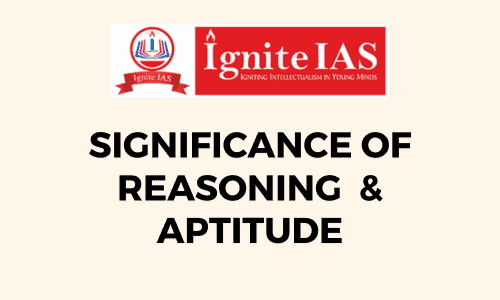Introduction
In today’s competitive world, where problem-solving and critical thinking skills are highly valued, reasoning and aptitude play a crucial role in shaping an individual’s success. Reasoning refers to the ability to think logically and make informed decisions, while aptitude represents a person’s inherent talent and potential to excel in specific areas. In this article, we will explore the significance of reasoning and aptitude in various aspects of life, education, and career, and how honing these skills can lead to personal and professional growth.
Understanding Reasoning and Aptitude
Before delving into their significance, it is essential to grasp the meaning of reasoning and aptitude. Reasoning involves the process of analyzing information, evaluating options, and drawing conclusions based on logic and evidence. It aids in problem-solving, decision-making, and critical analysis. On the other hand, aptitude refers to a person’s innate ability or talent in a particular field, such as mathematics, art, language, or music.
Importance in Education
Reasoning and aptitude play a vital role in the realm of education. Students with strong reasoning skills can comprehend complex concepts, connect ideas, and excel in subjects that require logical thinking, such as mathematics and science. Aptitude assessments help identify students’ strengths, enabling educators to tailor teaching methods and curriculum to cater to their individual needs, promoting a more personalized learning experience.
Enhancing Problem-Solving Abilities
In the professional world, problem-solving is a highly valued skill. Individuals with sharp reasoning abilities can tackle challenges methodically and arrive at effective solutions. Aptitude comes into play when choosing a career path, as aligning one’s talents with their chosen profession can lead to job satisfaction and success.
Career Advancement
Reasoning and aptitude are two significant factors that contribute to career advancement. Employees who can think critically and solve complex problems are sought after in various industries. Moreover, recognizing and nurturing one’s aptitude can lead to a fulfilling and prosperous career that aligns with their passion and skills.
Competitive Examinations
In the context of competitive examinations, reasoning and aptitude tests are common. These assessments evaluate candidates’ analytical and problem-solving capabilities, helping institutions and employers select the most suitable candidates. Aspirants can enhance their chances of success by sharpening their reasoning skills and focusing on areas where their aptitude lies.
Personal Development
Reasoning and aptitude are not limited to academics and professional growth; they also contribute significantly to personal development. People with strong reasoning skills tend to make better life decisions and handle challenges effectively. Recognizing and cultivating one’s aptitude can lead to hobbies and interests that bring joy and fulfillment in life.
Innovation and Creativity
Reasoning and aptitude are essential catalysts for innovation and creativity. Individuals who can think critically and outside the box are more likely to come up with groundbreaking ideas and solutions. Aptitude in creative fields such as arts, writing, or design can lead to the creation of exceptional and original works.
Relationship Building
Effective reasoning and understanding one’s aptitude can also improve interpersonal relationships. Good communication and empathetic reasoning help in resolving conflicts, building trust, and maintaining healthy connections with others.
Conclusion
Reasoning and aptitude are the driving forces behind personal and professional growth. They empower individuals to excel in various fields and contribute to their overall success and happiness. By recognizing and honing these skills, individuals can unlock their true potential and navigate life’s challenges with confidence and clarity.
FAQs
- Are reasoning skills innate, or can they be developed? Reasoning skills can be developed through practice, exposure to diverse situations, and a willingness to learn and grow.
- How can one identify their aptitude? Identifying one’s aptitude involves exploring different fields of interest, seeking feedback, and understanding where one’s talents and passions align.
- Can reasoning and aptitude be improved through online resources? Yes, various online resources, including puzzles, quizzes, and aptitude tests, can help individuals enhance their reasoning and aptitude.
- What role does reasoning play in decision-making? Reasoning plays a crucial role in decision-making as it involves evaluating pros and cons, considering consequences, and making informed choices.
- Can reasoning and aptitude be beneficial in everyday life? Absolutely! Reasoning and aptitude are valuable in everyday situations, such as problem-solving at home, making financial decisions, and pursuing personal interests.



